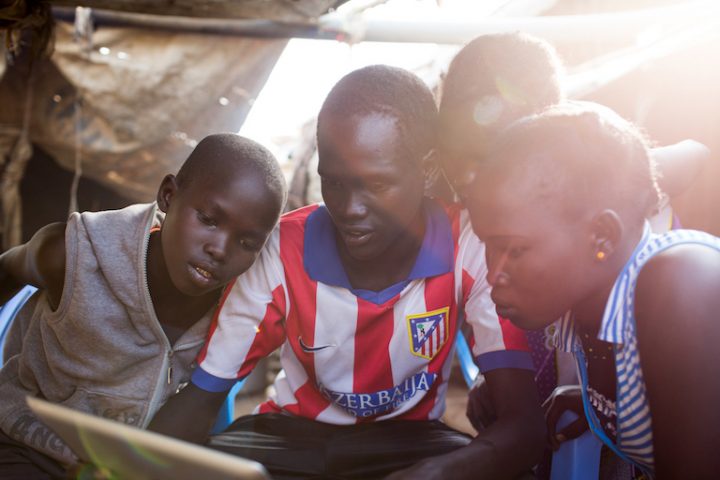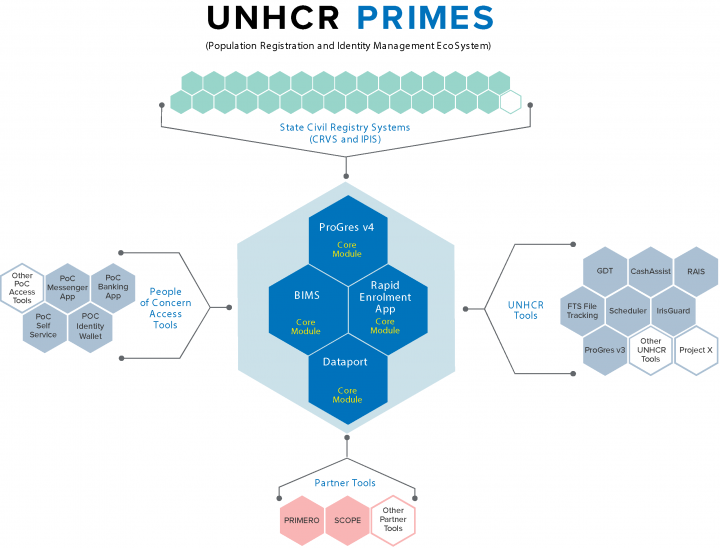
© UNHCR/Will Swanson
Today, more than 7 million refugees who have been forced to flee their homes due to conflict and human rights abuses are currently registered with UNHCR.
For the UN Refugee Agency and all humanitarian actors, the integrity, efficiency and effectiveness of protection, assistance and solutions programmes is highly dependent on the accuracy with which persons of concern are identified and their identity data managed. The main way to achieve these goals is through the registration process.
For decades, UNHCR has been a reference in this practice. But the global displacement situation has become more aggravated than ever and the world in which UNHCR works – and in which today’s refugees and asylum seekers live – is changing rapidly, presenting new challenges and opportunities to improve the lives of people uprooted.
The UN Refugee Agency is rethinking its approaches to registration and identity management and taking advantage of new advances in information technology to modernize its systems. The overarching objective will be to develop and implement a new concept of digital identity that will empower the individual asylum seeker, refugee, and IDP.
The road to a more performing and empowering system will lead, via a revamped refugee registration and case management system (proGres version 4), the biometric enrolment system (BIMS), to a dedicated platform on which UNHCR, its partners, and the beneficiaries interact.
This new and innovative ecosystem of interoperable tools and applications is called PRIMES (Population Registration and Identity Management EcoSystem) and will provide better access to opportunities and services for refugees and other forcibly displaced persons.

Through PRIMES, we will encourage the decentralized development of applications and the usage of new technologies in the field. The first PRIMES application (other than proGres v4 and BIMS) is currently being developed and will be field tested in January 2018. It is a handheld rapid registration app that can be used both off and on-line, as well as on GSM networks.
The roll-out of proGres v4 is a key event in establishing PRIMES as it creates a single global population registry, replacing almost 500 databases world-wide on which refugee data is currently hosted. The deployment plan is ambitious: all operations should be on the new platform by the end 2019. To accompany the roll out of this innovative eco- system, PRIMES Support, a team of specialized functional and technical experts, will provide support to all users regardless of whether they work for UNHCR or our partners.
With that extended reach, PRIMES will build on the Agency and its partners’ strengths and comparative advantages. It will both embrace and lead change in registration, identity and case management, for the benefits of all the people we care for: asylum seekers, refugees, IDPs, stateless and all other forcibly displaced men, women and children.

Congratulations on this great development.
Hi guys, this is great news. I’m curious and wondering if I can learn more about:
– What is PRIMES + PRIMES application based on? Replacing 500 databases sounds like a common data services project
– Which operations will it be tested at?
– What’s your strategy for meeting disparate tech and functional requirements across operations?
– Will it link with or replace RAIS and other UNHCR tools?
– How realistic is it to link with SCOPE?
Thanks
Chris
Dear Chris,
Please see our replies to your questions below:
– What is PRIMES + PRIMES application based on? Replacing 500 databases sounds like a common data services project
PRIMES, UNHCR’s new Population Registration and Identity Management EcoSystem is a platform which brings together interoperable UNHCR tools and applications used for registration, identity management and case management. Currently, the PRIMES platform contains proGres v4, BIMS, the Rapid Registration Tool and the Dataport. Eventually, PRIMES will allow for the development of more tools and applications in Field Operations and at Headquarters. PRIMES includes a set of directives that govern how data should be exchanged and used within the ecosystem. This enhances flexibility and allows us to facilitate country and field based initiatives while still making sure that the ecosystem maintains coherence.
– Which operations will it be tested at?
As PRIMES is an ecosystem of applications, operations can have some flexibility with which applications they will want to roll-out. However, some applications are mandatory for UNHCR operations. Parts of the ecosystem has already been rolled out. For example, proGres v4 has been rolled out in 30 countries and BIMS in 43 countries. Other parts are still in development. The Rapid Registration tool will be piloted in March in Southern Africa.
– What’s your strategy for meeting disparate tech and functional requirements across operations?
Developing an application that can be used in the multitude of milieu in which UNHCR operates is a real challenge. Having a set of core modules that everyone can use, coupled with directives on how to interact with and within this ecosystem will provide the necessary flexibility required to respond to refugees needs.
– Will it link with or replace RAIS and other UNHCR tools?
Some of the UNHCR tools have already been integrated within PRIMES and some others are in the works. RAIS will be integrated within PRIMES.
– How realistic is it to link with SCOPE?
The feasibility of an integration with SCOPE or PRIMERO are being explored at corporate level. The interoperability with these tools is not a technical issue, however, global data sharing agreements will need to be agreed upon prior to completion.
Dear Colleagues,
We’re running into similar problems at ICRC and are interested to learn more about PRIMES and how the beneficiary ID are structured. As we’re also planning to deploy a new Case Management platform to better collaborate internally and with our external partners such as UNHCR, please feel free to contact me to discuss further. Thanks.
Regards.
-Youcef
Great news and fantastic job !
Wow, this is what we have been waiting for
This is amazing! Thank you for establishing mechanisms like this one! Exited to see its impact in the following years
this is great!